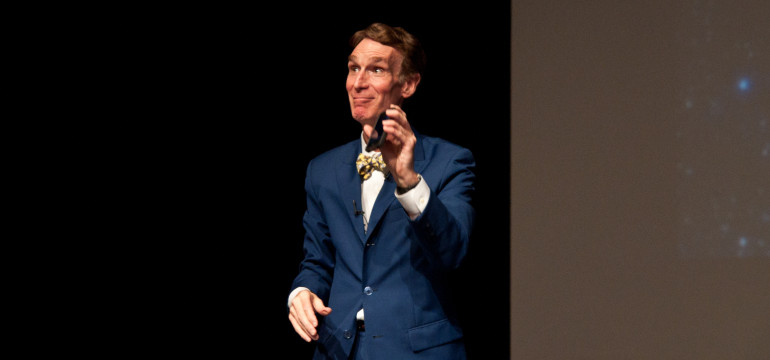By: Elizabeth Clark
Growing up, everyone has a notable figure that influenced his or her educational development. If you happen to be a nineties kid, like myself, one such figure comes to mind: Bill Nye The Science Guy.
Nye was the host of a popular educational television program titled “Bill Nye: The Science Guy” which featured the comedic, Cornell-educated scientist teaching his audience about various scientific topics in each episode. Nye covered subjects such as Cells, Outer Space, Electricity and even Garbage just to name a few. The aim of Nye’s show was to educate young audiences about how much fun science can be, as well as to enlighten them about how much science impacts their daily lives. It goes without saying that Bill Nye had a huge influence on a generation of future scientists.
Even though his television series ended in 1998, Nye continues to have a public impact by going after pseudoscience and science denial, such as rallying against the idea of teaching creationism in public schools and defending the importance of vaccines. Nye is also a champion for scientific ideas including evolution and climate change; however his opinion about genetically modified organisms (GMO) has been a point of contention within the scientific community.
A genetically modified organism is any organism of which the genetics have been altered through the use of modern biotechnology to create a novel combination of genetic material. GMOs may be a source of genetically modified food ingredients and are also widely used in scientific research to produce goods other than food.
While most scientists agree that approved GMO foods are safe, Nye’s arguments have never been in favor of GMOs. In his book, Undeniable: Evolution and the Science of Creation, published in November 2014, Nye has a pretty straightforward opinion about GMOs.
“If you’re asking me, we should stop introducing genes from one species into another,” Nye writes, because “we just can’t know what will happen to other species in that modified species’ ecosystem.
Nye has suggested that there is something fundamentally problematic with foods containing GMO crops. He has even argued that GMOs may carry environmental risks that we can never rule out with certainty. This opinion had angered many scientists, especially when there is evidence to support that GMOs could be the key to feeding a world population, which is approaching 9 billion by the year 2050.

(source: mauiwatch.com)
So until very recently, not only was Bill Nye “The Science Guy”, but he was also the anti-GMO guy. That is, however, until he visited Monsanto and met with the scientists who work there. In interview with Real Time’s Miles Lecher in February, Nye was quoted saying:
“I went to Monsanto and I spent a lot of time with the scientists there and I have revised my outlook and I am very excited about telling the world,” Nye said during the interview. “When you’re in love you want to tell the world.”
Nye even went so far as to announce that he plans to revise the chapter on GMOs in his book, which will be republished Fall of 2015.
This raises the question, why the sudden change in opinion? Nye hasn’t really elaborated why he had the change of heart, but it could be due to the fact that during his visit to Monsanto, Nye was able to see first hand how genetic modification is actually done. The ability to talk one on one with the scientists likely cleared up many questions and concerns Nye had about GMOs. While many of us may never have the opportunity to seek the answers to our own genetic modification questions with experts, like Nye did, we can take into account the information we have available to about GMOs.
As peer-reviewed scientific studies on GMOs have piled up over the time, scientific organizations ranging from the National Academy of Sciences to the World Health Organization have analyzed them and reached similar conclusions: GMOs on the market today are no riskier for your health than their non-GMO equivalents.
In the field of science, nothing is ever proven to be true unless it has undergone extensive research. This is why scientists are continually performing on-going studies to collect data that can validate the safety of GMOs. With this data, scientists and skeptics alike can draw their own conclusions about GMOs just like Nye has done.
References
“Bill Nye.” Bio. A&E Television Networks, 2015. Web. 01 Apr. 2015.
Nye, Bill. “Genetically Modified Foods-What the GMF?” Undeniable: Evolution and the Science of Creation. New York City: St. Martin’s, 2014. 229-237. Print.
“Questions & Answers on Food from Genetically Engineered Plants.” US Food and Drug Administration (FDA), 22 July 2014. Web. 31 Mar. 2015. <http://www.fda.gov/Food/FoodScienceResearch/Biotechnology/ucm346030.htm>.
Interview: https://www.youtube.com/watch?v=81FAqQ1qSiQ
Cover image: www.wikimedia.org






Be careful about who champions your cause.
An interesting article. Do you trust enough in GMO foods to not know the future repercussions that may lie ahead even though there are a lot of advantages?
Watch for the Skeptics Guide to the Universe podcast this weekend. If they have time to process it, there should be an interview with Nye where Steve Novella specifically asked him more details on this.
The technology in GMO foods has managed to produce more products, reduce pesticides in the production thereof and plays a crucial role in the global issue, which is hunger. Although many of us may still be skeptical regarding this technology, it is reducing an epidemic many of us want solved.
u14036968
I’d be leery of Nye’s ‘overnight conversion’ to GMO advocacy, particularly given the nature of the claims he has raised in the past – which are essentially open-ended skepticism with no real means of resolution.
Also, his ‘climate change’ advocacy in this context is troubling – given what that movement is about, and its essentially non-scientific attitudes. The latter include ‘science by majority’ (a truly abysmal and non-scientific way to conduct research and actual inquiry), ‘science by approval’ (which one can find out about by reading up on Michael Mann and his antics), ‘science by fakery’ (again, look into what Mann and his followers have gotten up to in terms of falsifying, eliminating, and misrepresenting data) and ‘science by claim of settlement’ (true science is never ‘settled’ and it is questioned much more rigorously than most ‘climate change science’ ever has been – at best in science one deals with ‘givens,’ theories, and probabilities).